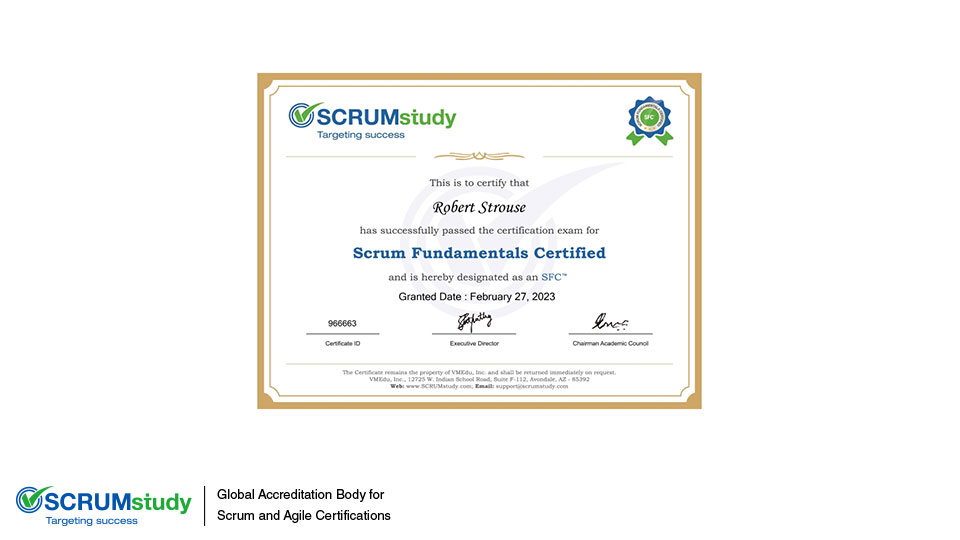Scrum Certification Requirements
Posted by SCRUMstudy® on July 12, 2024
Categories: Certification
Scrum certification requirements vary depending on the certifying body, but generally include completing a specific training course and passing an exam. For entry-level certification like the Certified ScrumMaster (CSM) from Scrum Alliance, candidates must attend a two-day course taught by a Certified Scrum Trainer and then pass an online test. More advanced certifications, such as the Professional Scrum Master (PSM) from Scrum.org, allow candidates to self-study and take the exam directly. Higher-level certifications often require demonstrated experience in Scrum roles, completion of advanced coursework, and passing more rigorous exams. Continuous learning and renewal of certifications are encouraged to maintain expertise in Scrum practices.
The Scrum Developer Certification Requirements, provide a clear and structured pathway for individuals aiming to attain proficiency in Agile software development practices. This certification program is designed to equip developers with the essential skills and knowledge needed to effectively contribute to Scrum teams and deliver high-quality products. The SBOK™ Guide meticulously details the prerequisites and criteria for obtaining Scrum Developer Certification, which typically include a combination of formal training, practical experience, and passing a certification exam. Candidates are expected to demonstrate proficiency in key areas such as Agile principles, Scrum frameworks, and software engineering practices. By fulfilling the certification requirements outlined in the SBOK™ Guide, developers can validate their expertise in Agile development and enhance their professional credibility within the industry. Moreover, the certification serves as a testament to an individual's commitment to continuous learning and improvement, positioning them as valuable assets to organizations seeking to adopt Agile methodologies. Thus, by adhering to the guidelines provided in the SBOK™ Guide, aspiring Scrum Developers can embark on a rewarding journey towards certification and professional growth in Agile software development.octored exam will be conducted at the end of the course.
Who Should Take the SDC™ Certification?
The SDC™ certification is ideal for:
Software Developers: Professionals who actively code and build software products.
New Scrum Team Members: Individuals who are new to a Scrum team and need more explanation on the Scrum framework.
Professionals Looking to Switch to Scrum: Individuals who are looking to switch to Agile and Scrum practices from traditional project management roles.
Students and recent graduates: Individuals who want to add credibility to their resumes by obtaining an accredited Agile techniques certification.
Advantages of obtaining Scrum Developer Certification
Increased Career Opportunities: In Agile and Scrum contexts, the certification opens doors to many career chances because it is highly respected and recognized globally.
Improved Team Collaboration: Certified developers are more prepared to work in Scrum teams, which increases overall team productivity and collaboration.
Up-to-date Knowledge: Certification ensures that professionals are up to date on the most recent Scrum techniques and methodology.
Greater Project Success Rates: As certified members better understand and use Scrum methods, their teams are more likely to successfully finish projects on schedule and under budget.
Competitive Advantage: Professionals can stand out in a crowded employment market by possessing a recognized credential.
Conclusion
Scrum Developer Certification (SDC) is a useful certification for individuals who want to go up in the Agile and Scrum field and enhance their careers. By providing developers with a solid foundation in Scrum principles and practices, the SDC certification allows them to contribute more effectively to their teams and increases the likelihood that their project will succeed. The SDC™ certification is valuable for developers, team members, and professionals transitioning to Agile techniques.
Agile Scrum Certification requirements
Posted by SCRUMstudy® on June 24, 2024
Categories: Agile Product Backlog SBOK® Guide Scrum Sprint Backlog
Agile Scrum Certification requirements typically include a combination of formal training, practical experience, and passing a certification exam. Candidates must complete a recognized Scrum course that covers essential principles, roles, ceremonies, and artifacts. Practical experience, often recommended as several months of working within a Scrum team, helps candidates apply theoretical knowledge in real-world settings. Finally, passing a certification exam, such as those offered by Scrumstudy (Scrum Master Certified, SMC) or Scrum.org (Professional Scrum Master, PSM), demonstrates a candidate’s understanding and competency in Scrum practices. These requirements ensure that certified professionals are well-equipped to contribute effectively to Agile teams and projects.
The Scrum Master Certification requires candidates to have a thorough understanding of Scrum principles and practices. This includes knowledge of key concepts such as iterative development, the roles and responsibilities within a Scrum team, and the importance of transparency, inspection, and adaptation. Candidates must also demonstrate proficiency in facilitating Scrum ceremonies, managing the product backlog, and ensuring that the team adheres to Scrum values and processes. Additionally, practical experience in applying Scrum in real-world projects is highly beneficial to meet the certification requirements effectively.
This program typically covers the principles and practices of Scrum, an agile framework for managing complex projects. Participants learn about Scrum roles, artifacts, events, and the core values and principles of agile methodologies. The certification process often includes a combination of coursework, hands-on exercises, and a final assessment to validate one's understanding and proficiency in applying Scrum practices. Scrum Master Certified (SMC) is recognized for their ability to enhance team collaboration, productivity, and deliver high-quality projects in iterative cycles.
Scrum Master certification holds significant importance in the agile landscape as it validates individuals' proficiency in Scrum methodology. This certification demonstrates a thorough understanding of Scrum principles, roles, events, and artifacts, essential for effective project management. Employers often seek certified Scrum Masters to lead agile teams, drive organizational change, and ensure successful project delivery. Certification not only enhances job prospects but also signifies a commitment to continuous learning and professional development. Moreover, certified Scrum Masters contribute to building high-performing teams, fostering collaboration, and maximizing business value, making their role indispensable in today's dynamic and competitive business environment.
We will attempt to do a quick overview of some of the Scrum certifications that are currently being offered.
Then, we will talk about figuring out the right trainer. It is beneficial to find a Scrum trainer with the background as yours however it is not an absolute requirement. The framework and the style of the Scrum training can vary from trainer to trainer, so you should try to figure out which one suits your learning style.
The biggest positive of a formal Scrum training is that you learn everything in a controlled environment. You meet people who are also there to learn about Scrum and in case you have common background, it helps to understand the process and difficulties of implementation from outsider’s point of view. A formal training also helps you understand about the mistake which you may make due to the traditional project management concepts rooted in you.
The main purpose of any certification is to impart a common baseline of the knowledge. These Scrum certifications, compared to any other project management certifications have a very easy test. You should remember that getting a Scrum certificate is way easier than the implementing actual Scrum framework.
Scrum/Agile methodology in general gives you a lot of freedom in how you implement it. However you should avoid changing the essence of the whole process. These project managers are commonly referred as Scrumbut. The common suggestion is that you start to implement Scrum as it is until you understand it properly and then decide for yourself what you might want to change. After a while you may find that you don’t need to change anything at all.
You need to understand that nothing is more valuable than experience. Scrum or Agile Certification may only add some credibility and marketability to the individual.
Scaled Scrum Certification Requirements, Scaled Scrum Master Certification Requirements
Posted by SCRUMstudy® on June 14, 2024
Categories: Agile Certification Scrum Training
The Scaled Scrum Master Certification requires candidates to demonstrate a comprehensive understanding of Scrum principles and their application in large-scale projects. To be eligible, individuals typically need to have foundational Scrum knowledge, often validated through prior certifications such as the Scrum Master Certified (SMC™) designation. Additionally, practical experience in Scrum environments is crucial, as the certification emphasizes real-world application of scaling techniques and methodologies. The assessment process involves rigorous examination of advanced concepts like the Scrum of Scrums, scaling frameworks, and inter-team coordination, ensuring that certified professionals are equipped to manage and streamline complex, multi-team projects effectively. Continuous learning and professional development are also encouraged to maintain the certification's relevance in an evolving industry landscape.
The Scaled Scrum Master Certification (SSMC™) Online, is designed for Scrum professionals who aim to extend their expertise in scaling Scrum across multiple teams and complex projects. This certification equips practitioners with advanced skills to coordinate, manage, and implement Scrum processes effectively at an enterprise level. The SSMC™ curriculum covers essential topics such as managing distributed teams, synchronizing multiple Scrum teams, and handling intricate project dynamics, ensuring that participants can drive agile transformation and deliver substantial business value in large-scale environments.
Scrum Certification Professional Development focuses on enhancing skills and knowledge in Scrum, a popular Agile framework for managing complex projects. It involves earning certifications most popular being Scrum Master Certified (SMC) and Scrum Product Owner Certified (SPOC). These certifications validate one's expertise in Scrum principles, practices, and methodologies. Professional development in this field includes attending workshops, participating in training courses, engaging in practical Scrum projects, and continuous learning through reading and community involvement. It aims to improve one's ability to facilitate, implement, and optimize Scrum processes, leading to more efficient project delivery and higher quality outcomes.
It is often seen that Agile has been implemented successfully in different projects. But when it comes to Product Management or NPD (New Product Development), many people get sceptical regarding implementation of Agile. Now it has to be understood that Agile is not a methodology which can be used in a cookie cutter way across any organization. A lot of tweaking and customization is required to make it work. So, in product management, a proper assessment is required to see if Agile implementation will improve performance or not.
Here also, we need to see if the following two criteria are being fulfilled or not:
- Requirement Volatility : It is important to identify the volatility of requirements and whether working in Sprint will actually improve customer satisfaction, reduce uncertainty and help PM teams become more productive or not. If requirements are fixed in sand and are not dynamic in nature, it will not make any marked improvement even if the teams work in sprint. Also, Agile Product Life Cycle Management involves a lot of new learning, so it needs to be checked if the team will be comfortable in this transition or not.
- Frequent customer Interaction: External customers are big stakeholders in any Agile effort. In many product management scenarios, we have seen that customers just give their specifications and just go away for months and months. And finally when they come back for the product, it is completely different from what they expected, because market dynamics change and the expectations change as well. So the biggest benefit is actually to the customers themselves, and this is what the PM team should explain in details to the customers so as to get their buy in. Without their pro-active support, it will not be possible to implement Agile in any way.
If we are talking about New Product Development, then Agile actually becomes even more crucial and important. That is because neither the customers nor the PM team has any benchmark to follow. So, frequent discussions and brain storming sessions followed by change in requirements or prototypes will be mandatory for successful NPD. So, it is important to realize that Agile can be implemented successfully in Product Management as well, provided it is understood properly and used in the proper context. Also, management buy-in and customer buy-in are important components in this scenario, and a good AGILE coach will also be very beneficial.




